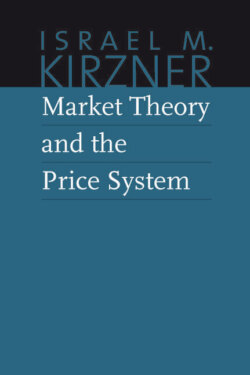Читать книгу Market Theory and the Price System - Israel M. Kirzner - Страница 13
На сайте Литреса книга снята с продажи.
THE MARKET SYSTEM
ОглавлениеTo the casual observer, market activity seems to be a bewildering and uncoordinated mass of transactions. Each individual in the market society is free to buy what and when he pleases, to sell what and when he pleases, to produce or to consume what he pleases, or to refrain altogether from any or all of these activities. Transactions may involve any of innumerable commodities or services, they may involve any of a wide range of quantities and qualities, and they may be concluded at any of a wide variety of prices.
Economic analysis reveals that this seeming chaos in the activity of market participants is only apparent. In fact, analysis shows that the exchanges that take place are subject to definite forces at work in the market. These market forces guide the individuals participating in the market in their decisions. Each market decision is made under the stress of market forces set up by the decisions, past or expected, of all the market participants. During any given period, therefore, the decisions made by individual market participants constitute an interlocking system embracing the entire scope of the market. This network of decisions constitutes the market system. The end results of all these decisions make up the achievements of the market system; and the tasks which society may seek to fulfill by permitting a market economy are the assigned functions of the market system.
The importance of the market system and of its analysis is not simply the discovery that decisions are made under constraints set up by other decisions. Market system analysis, we will discover, reveals a remarkable feature in the operation of these constraints, and it is chiefly this feature that invests market theory with its importance. The real significance of the market system lies in the fact that the mutual interplay of these constraints makes up a unique process through which the decisions of different individuals (who may be quite unknown to one another) tend to be brought progressively into greater consistency with each other.
Consistency and correspondence between the decisions made by different market participants are of the first importance in any successful execution by the market of its functions. If all potential members of the labor force decided to train themselves as skilled watchmakers, a catastrophic aberration of individual decisions would exist. After all, a decision to become a watchmaker depends on the confident assumption that some other people will be barbers, tailors, etc.
The free interplay of individual decisions in the marketplace constantly generates new forces modifying and shaping the delicate, sensitive, and interlocking decision network that makes up the system. It is the task of market theory to trace the consequences of these market forces, paying particular attention to the degree in which they constrain independently made decisions into mutually corresponding and concordant systems.
